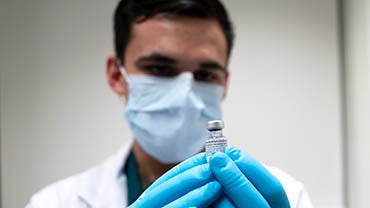
Who are the unvaccinated? How might these groups be convinced to receive the COVID-19 vaccine?
These are some of the challenging questions that graduate students in the Integrated Marketing Communications Master’s Program at Georgetown’s School of Continuing Studies are trying to answer. Throughout the semester, students have been working on portfolio-ready strategic integrated marketing communications plans aimed at driving adoption of the COVID-19 vaccine for targeted groups.
Faculty in the Integrated Marketing program partnered with the School of Continuing Studies Library as they facilitated this project. In collaboration with program faculty, librarians created a Campaign for Vaccine Acceptance research guide that students use to find peer-reviewed research, news articles, podcasts, and books. The guide also highlights recurring publications focused on vaccine sentiment, such as the Kaiser Family Foundation Vaccine Monitor, and other well known COVID-19 vaccine trackers. Because data on COVID-19 and vaccinations are constantly changing, students have to stay current to be able to present a convincing campaign. “The databases and research guide the Library made available helped students access fast-changing information in real time as they researched potential audiences,” said Sarita Bhargava, faculty instructor in the Integrated Marketing program.
Public Services Librarian Matt Bernstein also provided information literacy instruction to students, which focused on practical techniques for evaluating information in a rapidly changing research environment. SCS librarians also provided one-on-one research consultations to further support student research projects. “Because Matt had been looped into the campaign project, he helped them validate audiences and gather more data and research to develop insights that become the heart of their campaign efforts,” Bhargava added.
As part of this project, students segmented their audience and identified a key target group. They then used primary and secondary research to glean insights that helped them better understand vaccine hesitancy among their target audience. Finally, they applied this understanding to reposition the benefits of the vaccine and develop messaging and media strategies to persuade their target audience. “Their target audiences are very narrow for this project, so having conversations with Matt and exploring the data available has made it possible for them to create some very specific campaigns,” said Ani Matson, faculty instructor in the Integrated Marketing program. These campaigns will be included in an early December showcase, where teams will present their campaigns to a group of esteemed marketing professionals.
